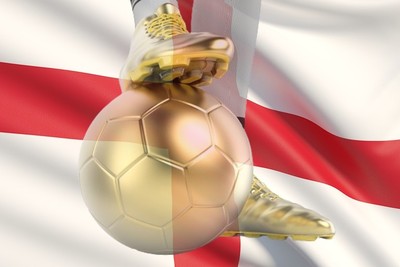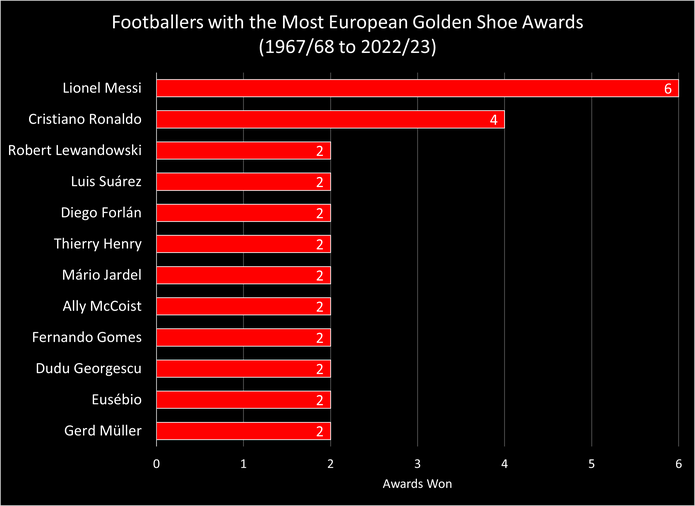 For strikers, there is no better feeling in football than scoring goals.
For strikers, there is no better feeling in football than scoring goals.
Sure, winning trophies is nice to celebrate with your teammates, but if you hooked up a frontman to a lie detector and asked them what drives them on, most would say the personal glory of putting the ball in the back of the net.
The good news for strikers in Europe is that they can be rewarded for their goalscoring efforts courtesy of the European Golden Shoe, a trophy that heralds the sharpest marksman on the continent.
It’s an award that English players haven’t exactly been prolific winners of in the past, but that could all change in 2023/24 courtesy of Harry Kane, the Bayern Munich and England striker that is setting the German Bundesliga alight.
He blasted 17 goals in his first eleven games in the competition, putting him on course for a season in which all manner of records could be broken. To put that effort into context, the top goalscorer award in the German Bundesliga in 2022/23 was shared by Christopher Nkunku and Niclas Fullkrug – they managed 16 goals in the entirety of the campaign.
During the 2020/21 Bundesliga season, Robert Lewandowski blitzed 41 goals – Kane is on course to beat that record and, perhaps, become just the second Englishman to win the European Golden Shoe. But who was the first?
You’ll find out later in this article….
How Does the European Golden Boot Work?

Because the European Golden Shoe – or Golden Boot, if you prefer – is open to any player operating in a league on the continent, you might be thinking that there’s been all sorts of weird and wonderful winners of the trophy over the years.
But the methodology to work out the winner is such that those plying their trade in Europe’s top five leagues – Premier League, Bundesliga, La Liga, Serie A and Ligue 1 – are handed an advantage, theoretically speaking.
To ensure that each league in Europe has an equal weighting, despite the obvious differences in the quality of the football, the award’s organisers – European Sports Media – have used UEFA’s coefficients system to equalise all of the various leagues.
So, goals in the ‘big five’ leagues count double, with those ranked sixth to 22nd in UEFA’s coefficients earning a 1.5x boost to their goal tally. Any leagues ranked below this will simply be judged on how many times they find the net.
Unsurprisingly, the European Golden Shoe has therefore been won by a player from one of the big five leagues every season since 2002/03 – Brazilian goal machine Mario Jardel the last striker to claim the trophy from outside the elite having notched 42 goals for Sporting Lisbon in 2001/02.
Who Has Won the Most European Golden Boots?
Another prestigious trophy in football, another award dominated by Lionel Messi….
It’s true: since the origins of the European Golden Shoe in 1967/68, nobody has won more the award more times than the Argentine.

His six victories all came during his goal-den spell at Barcelona, with the only other players to lift the trophy in Messi’s period of dominance between 2009/10 and 2018/19 being Cristiano Ronaldo and Luis Suarez.
Indeed, Messi and Ronaldo are the only players to have won it more than twice – CR7 has four replica Golden Shoes in his cabinet, earned from his spells at Manchester United and Real Madrid.
It should be said that the coefficient system of calculating the winner was only introduced in 1997, so it’s possible that some prolific strikers in the top leagues prior to then might have scooped the award more times under the contemporary scoring system.
That also explains some of the more obscure players to have won the European Golden Shoe. With no disrespect intended, Peter Zhekov (CSKA Sofia, 1968/69), Dudu Georgescu (Dinamo Bucharest, 1974-75 and 1976/77) and Hans Krankl (Rapid Vienna, 1977-78) are not the first names that spring to mind when considering the most goal-happy strikers in continental history….
Has an Englishman Ever Won the European Golden Boot?
So, back we go to our original question….
The answer is yes, an Englishman has won the European Golden Shoe. Although it might not be the player you were thinking of.
Kevin Phillips was a veritable goal machine for Sunderland back in the day, and a particularly productive season with the Black Cats in the Premier League in 1999/2000 yielded 30 goals.
With the 2x coefficient added given the big five weighting, that gave Phillips a score of 60 – crowning him as the European Golden Boot winner.
There has been other UK based winners, albeit in the days before the coefficient metric was introduced. In fairness, Ian Rush wouldn’t have needed that anyway in 1983/84 – he blasted 32 goals in the English top-flight, then known as Division One, to take the spoils.
But Ally McCoist, who won the European Golden Shoe in back-to-back seasons between 1991 and 1993, would have missed out given that his goals came for Rangers in the Scottish Premiership.
And Welshman David Taylor? Well, he wouldn’t have been in the conversation back in 1993/94 given that his 43 goals came in the League of Wales, but the Golden Boot is an incredible prize that nobody can take away from him.